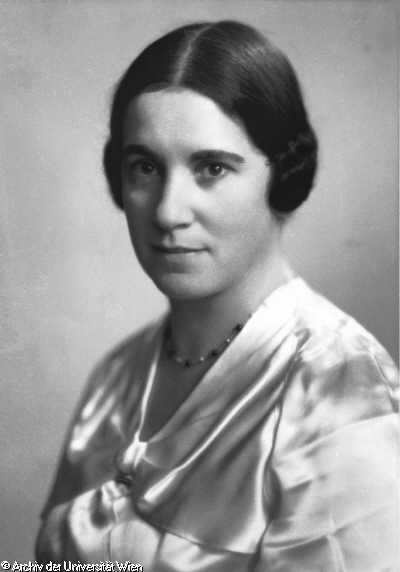Gertrud Herzog-Hauser
| Born: |
06-15-1894 |
| Faculty: |
Philosophical School |
| Category: |
Expelled teacher |
Gertrud HERZOG-HAUSER (born on June 15th, 1894 in Vienna, died on October 9th, 1953 in Vienna) was Pd for Klassische Philologie at the Philosophical School of the University of Vienna.
She was persecuted in times of Nazism because of her political orientation lost her position and was thrown out of the university in 1938.
Herzog-Hauser, the daughter of a secondary school teacher,[1] studied classical philology, antiquity studies, German philology and philosophy in Vienna and Berlin, obtained her doctorate in Vienna in 1916 with her dissertation “Harmonias Halsband” and then went into teaching.[2] From 1917 to 1937 she taught Latin and Greek at the secondary school for girls in Vienna’s eighth district after which she became the principal of the Rahlgasse secondary school for girls.[3] She habilitated in 1932 with the paper “Soter. Die Vorstellung des Retters im altgriechischen Epos”.[4]
After the “Anschluss”, as of April 22nd, 1938, the ministry of education revoked her venia legendi,
[5] while she also lost her position as principal in the Rahlgasse school. According to the “Nuremberg la3ws”, Herzog-Hauser was classified as “Mischling 1. Grades” (“half-Jew”), even though she was a practicing Catholic.
[6] At the same time, the National Socialists imposed a work and exhibition ban on her husband Carry Hauser, an anti-fascist. While Carry Hauser subsequently emigrated to Switzerland, Herzog-Hauser fled with her son to Holland, where they hid in a retirement home and managed to survive. Herzog-Hauser’s brother was murdered by the National Socialists.
[7]
After the end of the war, she at first went to Switzerland, until her venia legendi was restored in 1946 and she returned to Vienna. There she was able to teach at the Wenzgasse secondary school for girls,
[8] but she could not return to the positions she had held before the “Anschluss”. An appointment as an associate professor at the University of Vienna also was refused and she had to make do with smaller teaching positions for Latin grammar exercises. In 1946, she finally received the title of associate professor. Three years later her application for a chair at the University of Innsbruck failed due to anti-Semitic prejudices.
[9]
In her works she first and foremost addressed ancient mythology and the history of religion, the Roman imperial cult, Severan empresses, biography in the late antiquity as well as Antonius of Padua.
[10] In her theological and historical studies she especially tried to prove the kinship between Greco-Roman and Jewish-Catholic culture.
[11] Apart from this, she also substantially contributed to the fields of girls’ and women’s education and teaching methodology of ancient languages, as well as to teacher training.
[12]
In the First Republic, she was, among other things, vice president of the “Verein der Schriftstellerinnen und Kuenstlerinnen Oesterreichs” (Association of female authors and artists of Austria).
[13]
Lit.: Austrian State Archive/AdR, PA Herzog-Hauser; Austrian State Archive/AVA, PA Herzog-Hauser; UA, PH PA 1947; Archive of the University of Vienna/PHIL GZ 659 ex 1937/38; MÜHLBERGER 1993, 42; Eva CESCUTTI, Herzog-Hauser, Gertrud, in: KEINTZEL/KOROTIN 2002, 281f; Ilse KOROTIN/Heidi SCHRODT, Hg., Gertrud Herzog-Hauser (1894-1953). Klassische Philologin, Universitätsdozentin und Schuldirektorin, Wien 2009; PLANER 1929; BiografiA.
[1] Renate GÖLLNER, Gertrud Herzog-Hauser und die Emanzipation, in: Ilse Korotin/Heidi Schrodt, Hg., Gertrud Herzog-Hauser (1894-1953). Klassische Philologin, Universitätsdozentin und Schuldirektorin, Wien 2009, 36-49, 38.
[2] Eva CESCUTTI, Gertrud Herzog-Hauser und die klassische Philologie, in: Korotin/Schrodt 2009, 17-25, 17-19.
[3] KOROTIN 2009, Anhang: Biographie, 84-85.
[4] CESCUTTI 2009, 17-19.
[5] UA, PHIL GZ 659-1937/38, O.-Nr. 70, PHIL Dekanat an Herzog-Hauser, 23. 4. 1938.
[8] KOROTIN 2009, Anhang: Biographie, 84-85.
